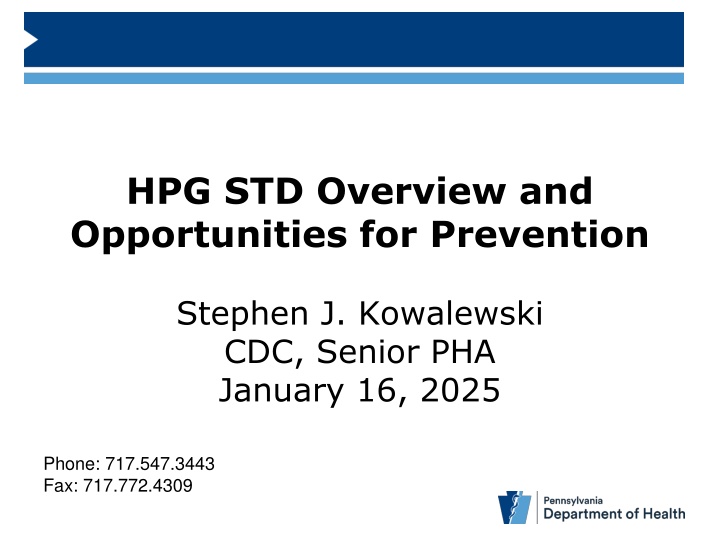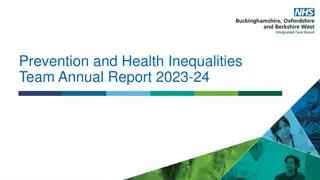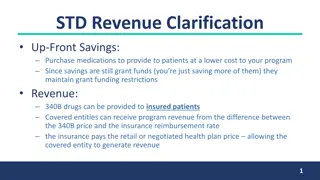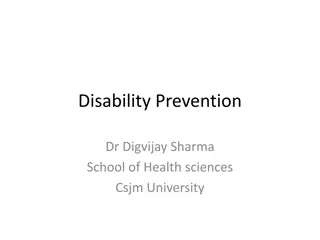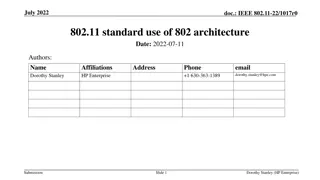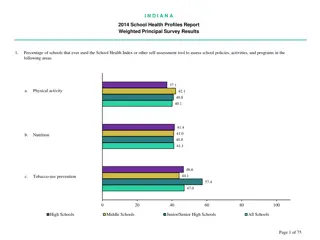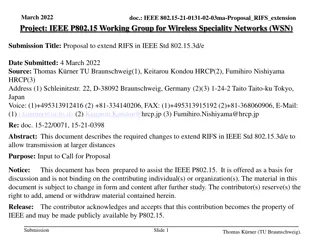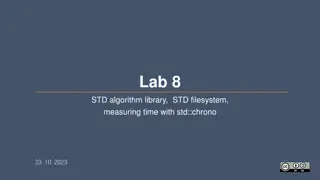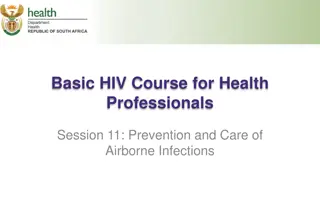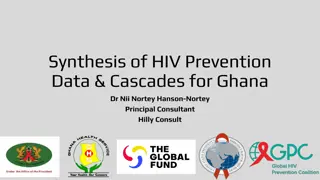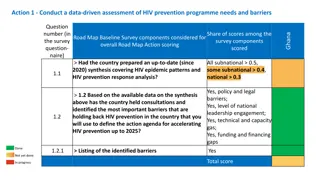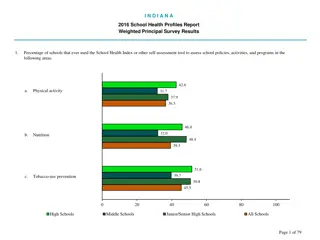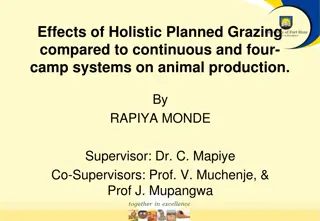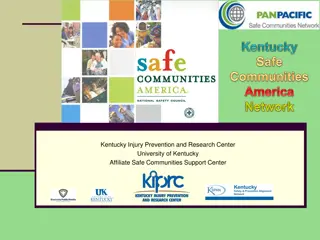HPG STD Overview and Opportunities for Prevention
Syphilis cases in Pennsylvania, particularly among young individuals, have seen a concerning rise. This report examines the escalating rates of primary and secondary syphilis, projected trends, and opportunities for prevention, including key demographic insights. The data underscores the urgent need for targeted interventions and public health measures to combat the spread of syphilis and safeguard public health.
Download Presentation

Please find below an Image/Link to download the presentation.
The content on the website is provided AS IS for your information and personal use only. It may not be sold, licensed, or shared on other websites without obtaining consent from the author.If you encounter any issues during the download, it is possible that the publisher has removed the file from their server.
You are allowed to download the files provided on this website for personal or commercial use, subject to the condition that they are used lawfully. All files are the property of their respective owners.
The content on the website is provided AS IS for your information and personal use only. It may not be sold, licensed, or shared on other websites without obtaining consent from the author.
E N D
Presentation Transcript
HPG STD Overview and Opportunities for Prevention Stephen J. Kowalewski CDC, Senior PHA January 16, 2025 Phone: 717.547.3443 Fax: 717.772.4309
State of Syphilis in Pennsylvania Statewide reported primary and secondary (P&S) syphilis is at the highest rate in more than 30 years. The number of reported congenital syphilis cases is at the highest rate in recorded history. In CY 2022, a total of 13 congenital syphilis cases were reported in Pennsylvania (exclusive of Philadelphia). In CY 2023, a total of 29 congenital syphilis cases were reported in Pennsylvania (exclusive of Philadelphia). Individuals under the age of 30 accounted for: 53 percent of the reported P&S syphilis in 2023 76 percent of the reported gonorrhea in 2023 89 percent of the reported chlamydia in 2023
Projected 2024 Primary and Secondary Syphilis in Pennsylvania Impact on Reported Congenital Syphilis In 2022 there were 1,640 cases of early syphilis. In 2024, based on the first 10 months of data it is anticipated there will be a 50% decrease to 825 cases. In 2022 there were 1,319 cases of early syphilis in males. In 2024, based on the first 10 months of data it is anticipated there will be a 50% decrease to 661 cases. In 2022 there were 320 cases of early syphilis in females. In 2024, based on the first 10 months of data it is anticipated there will be a 50% decrease to 154 cases. Currently 58 of the 62 counties in the project area are experiencing significant decreases in reported Early Syphilis.
Reported Cases of Primary and Secondary Syphilis in Pennsylvania* 2004 to 2024 700 Number of Reported Cases 600 500 400 300 200 100 0 2004 2006 2008 2010 2012 2014 2016 2018 2020 2022 2024** Year Female Cases Male Cases *Data Exclusive of Philadelphia ** 2024 Provisional Data Based on Reports as of 12/15/2024
Primary and Secondary Syphilis Rates of Reported Cases Among Women Aged 15 44 Years by Jurisdiction, United States and Territories, 2014 and 2023 * Per 100,000 5
Reported Cases of Early Syphilis 2022 and 2023 Pennsylvania by Age 400 350 Number of Reported Cases 300 250 200 150 100 50 0 Under 15 15-19 20-24 25-29 30-34 35-39 40-44 45-49 50-54 55-59 Greater than 60 Age 2022 2023
2023 Early Syphilis Pennsylvania (Exclusive of Philadelphia)
Reported Cases of Early Syphilis in Pennsylvania 2019 through 2024** Among People Living with HIV 30.00% 27.33% 25.00% 23.15% 22.97% 21.84% 21.52% 21.25% 20.00% 15.00% 10.00% 5.00% 0.00% Year *Exclusive of Philadelphia **2024 Provisional Data Based on Provisional Data as of 12/15/2024
Reported Cases of Congenital Syphilis in Pennsylvania from 1990 through 2024* 35 30 Number of Reported Cases 25 20 15 10 5 0 Year *Exclusive of Philadelphia **2024 Provisional Data Based on Provisional Data as of 12/15/2024
Snapshot of Congenital Syphilis Cases Pennsylvania 2023 2023 No Prenatal Care 7% 4% Barriers to healthcare due to immigration status In Prenatal Care patient received care per CDC recommendations In Prenatal Care patient did not receive care per CDC recommendations Treated, inappropriate reponse with evidence of treatment failure 25% 50% 14% N=29
2023 Congenital Syphilis Pennsylvania (Inclusive of Philadelphia)
Congenital Syphilis Rates of Reported Cases by Year of Birth and Jurisdiction, United States and Territories, 2014 and 2023 * Per 100,000 live births 12
Congenital Syphilis Prevention Recommendations All pregnant individuals need to be enrolled in routine prenatal care. All pregnant individuals need to have a syphilis and HIV test at the first prenatal visit. All pregnant individuals need to have additional serologic testing for syphilis at: The third trimester of pregnancy; The delivery of a child; or The delivery of a stillborn child Or anytime when another concurrent STD is noted.
Reported Cases of Gonorrhea in Pennsylvania 1976 through 2024* 14000 12000 10000 Number of Reported Cases 8000 6000 4000 2000 0 Year *Data Exclusive of Philadelphia ** 2024 Provisional Data Based on Reports as of 12/15/2024
Reported Cases of Gonorrhea 2023 Pennsylvania* by Age 3000 2500 Number of Reported Cases 2000 1500 1000 500 0 Under 15 15-19 20-24 25-29 30-34 35-39 40-44 45+ Year TOTALS *Exclusive of Philadelphia
Reported Cases of Gonorrhea in Pennsylvania 2019 through 2024** Among People Living with HIV 8.00% 6.69% 7.00% 6.00% 5.34% 4.87% 5.00% 4.32% 4.14% 4.12% 4.00% 3.00% 2.00% 1.00% 0.00% Year *Exclusive of Philadelphia **2024 Provisional Data Based on Provisional Data as of 12/15/2024
Reported Cases of Chlamydia in Pennsylvania 2019 through 2024** Among People Living with HIV 1.80% 1.66% 1.60% 1.38% 1.31% 1.40% 1.13% 1.20% 1.00% 0.98% 1.00% 0.80% 0.60% 0.40% 0.20% 0.00% Year *Exclusive of Philadelphia **2024 Provisional Data Based on Provisional Data as of 12/15/2024
Reported 2023 Gonorrhea and 2024 Pennsylvania STD Clinical Services 2024 STD Clinical Services Compared to 2023 Reported Gonorrhea PPA Sites SHC Sites Reported Gonorrhea Full listing of Free and Confidential STD/HIV Testing and Treatment Clinics available at: https://www.health.pa.gov/topics/programs/STD/Pages/STD.aspx
Opportunities for Promoting Syphilis, Gonorrhea, Chlamydia Screening and Treatment Outside Public Health Settings Seek opportunities to provide training to Urgent Care facilities staff to raise awareness for comprehensive STD and HIV testing especially in conjunction with suspected GC/CT infections. Explore the opportunities and barriers for the expansion of Syphilis and HIV testing to patients seeking care for GC/CT. Moving from a singular test (e.g., a Gonorrhea or Chlamydia test only) to a more comprehensive STD Panel that includes Syphilis, HIV, Gonorrhea, and Chlamydia testing). Consider adopting the reverse Syphilis Testing Algorithm as part of the STD Panel mentioned above. Promote structural EMR changes to include reminders for comprehensive STD testing when a patient presents for reproductive health care or single STD complaint.
Doxy-PEP Another Tool in the STD Toolbox for Prevention On June 6, 2024, Centers for Disease Control and Prevention (CDC) published guidance on the use of doxycycline as postexposure prophylaxis (doxy PEP) in certain patient populations to reduce the acquisition of the bacterial STIs chlamydia, gonorrhea, and syphilis. Doxycycline is an effective antibiotic to treat bacterial STIs. CDC recommends healthcare providers discuss doxy PEP with all gay, bisexual, and other men who have sex with men and transgender women with a history of at least one bacterial STI (syphilis, chlamydia, gonorrhea) in the last 12 months. If offering doxy PEP, healthcare providers should write a prescription for self-administration of 200 mg of doxycycline within 72 hours of oral, vaginal, or anal sex. When using doxy PEP data show that for high-risk populations there was a reduction in the following: Syphilis and chlamydia infections by >70%. Gonococcal infections by approximately 50%.
Doxy-PEP Considerations for Provider Usage The recommendations are based on a small study group. Studies among heterosexual cisgender women and adolescents are ongoing. Current efficacy data only applies to adult gay, bisexual, and other men who have sex with men (GBMSM), as well as transgender women. Some mild to moderate adverse outcomes noted. Frequent antibiotic use could disrupt the microbiome, the ecosystem of healthy bacteria that normally live in the gut and elsewhere in the body. Important questions remain about the effectiveness of this approach for other populations, as well as potential long-term development of antimicrobial resistance and impacts on the microbiome. Given potential unknowns, CDC is calling for long-term monitoring and evaluation as more data become available.
Prescribing Doxy-PEP 200 mg of doxycycline should be taken ideally within 24 hours but no later than 72 hours after condomless oral, anal or vaginal sex. Doxycycline can be taken as often as every day, depending on frequency of sexual activity, but individuals should not take more than 200 mg within a 24-hour period. Either doxycycline hyclate delayed release 200 mg (1 tab) OR doxycycline hyclate or monohydrate immediate release 100 mg (2 tabs taken simultaneously) are acceptable These CDC guidelines and have not yet been incorporated into the CDC Treatment Guidelines. https://www.cdc.gov/std/treatment/guidelines-for- doxycycline.htm
Doxy-PEP: Resources Resources: www.cdc.gov/std/treatment/doxycycline-as-pep-toe.htm www.cdc.gov/std/dstdp/dcl/2023-october-2-doxy-pep- guidelines.htm www.youtube.com/watch?v=2hYvrrK_W58 www.ncsddc.org/resource/doxy-as-sti-pep-command-center/
Populations to Consider for Doxy-PEP Pennsylvania reported approximately 3,248 unique individuals living with HIV, with a reported STD in the past three years. In some cases, repeat STD infections in this population were reported over the past three years. Individuals living with HIV with one or more reported STDs may benefit from Doxy-PEP Individuals Living with HIV with More than One Previous STD 8% 53% 39% Gonorrhea Chlamydia Syphilis
Sexual Health E-Learning Courses Interactive asynchronous online courses now available through the national site: https://courses.nnptc.org/eLearning.html Free and CE-accredited Interested? Check out our current courses and stay tuned for future topics!
Sexually Transmitted Diseases Contact Information For more information for providers regarding treatment recommendations and reporting assistance please call the STD Program at (717) 787-3981 For local information in your area 1-877-PA-HEALTH
